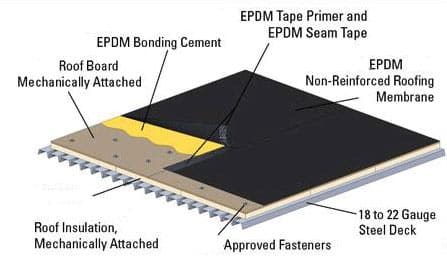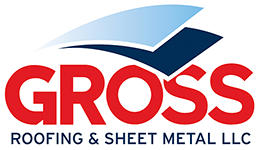Roofing Products
Offering Industry Leading Roofing Products & Materials
Gross Roofing & Sheet Metal LLC provides the best roofing products and installs the best materials in the commercial & industrial roofing industry. Our company guarantees a customized roofing system to meet your specific needs.
We Install Single-Ply Roofing Systems
Single-ply membranes are factory-manufactured sheet membranes. They generally are categorized as either thermoplastic or thermoset. Single-ply membranes can be installed fully adhered, mechanically attached or held down with ballast. Most single-ply roof systems do not receive surfacings.
- Types of single-ply membrane
- TPO
- PVC
- EPDM
Single-Ply Roofing Systems
PVC, TPO, & EPDM
Known for their excellent long-term strength, weather ability and flexibility, along with excellent resistance to punctures and tears.
PVC-Polyvinyl Chloride
PVC sheets are produced by calendaring, spread coating or extruding, and typically are reinforced with polyester or glass-fiber mats or scrim. PVC sheets contain plasticizers and stabilizers, as well as other additives to impart flexibility and achieve other desired physical properties. Some membranes are available with nonwoven fleece backing adhered to the underside of a sheet. PVC membranes are produced in numerous colors, though gray and white are the most common.
TPO-Thermoplastic Olefin
TPO sheets are a blend of polypropylene and ethylene propylene polymers and usually are reinforced with polyester. TPO sheets contain colorant, flame retardants, UV absorbers and other proprietary substances to achieve desired physical properties. TPO membranes commonly are white.
TPO and PVC
TPO and PVC roofing membranes deliver high reflectivity and emissivity. This keeps the building cooler and will reduce energy consumption. PVC and TPO roof membranes can be installed fully adhered, mechanically attached or ballasted. PVC and TPO are exceptionally resistant to chemicals, grease and UV light. There are many choices to suit a variety of applications and needs.
EPDM-Ethylene propylene diene terpolymer
This versatile membrane can be installed in a variety of ways: fully adhered, ballasted or mechanically attached. Most EPDM membranes do not receive surfacings. These installation methods deliver superior long-term weather ability and exceptional wind uplift resistance.
These types of roofing offer: cleaner, wider sheets, ease of heat welding and flexibility in a wide range of temperatures. Fully adhered, mechanically fastened or ballasted systems all deliver excellent performance in both new roof and re-cover applications.
Retro-Fit System

This type of system can be installed over a metal roof system. A Retro-Fit System encapsulates the roof top without the need for prepping, priming or expensive removal. Insulation is the key to this type of system. The insulation increases the R-Values and decreases energy costs. This type of roofing system provides a quieter system for the building occupants.
We Install Modified Bitumen Roofing Systems
Polymer-modified bitumen or modified bitumen sheet membranes have been in use in the U.S. since the mid 1970s. Polymer-modified roof membranes are composed of reinforcing fabrics that serve as carriers for the hot polymer-modified bitumen as it is manufactured into a roll material. MB roof system membranes are composed of multiple layers, much like BUR membranes. MB roof systems typically are installed as a two-ply system and almost always are fully adhered.
- Types of modified bitumen membrane
- APP
- SBS
Modified Bitumen Roofing Systems
APP and SBS Modified Bitumen Roofing Systems
Modified Bitumen roofing systems are available in a assortment of thicknesses and in smooth and granule surfaces.
APP System
Waterproofing medium asphalt modified with atactic polypropylene a thermo polymer. This type of membrane provide superior rooftop performance for both new and reroof applications. APP membranes may be installed by heat welding or with cold-applied adhesives.
SBS System
Styrene Butadiene Styrene forms a polymer network within the bitumen. SBS improves resistance to aging and weathering. SBS modified bitumen sheets are applied by hot mop asphalt, torch applied or adhered with cold process adhesives.
We Install Sheet Metal Systems
Sheet metal roofing refers to flat sheets of metal that can be used to sheath commercial roofing systems. Corrugated metal roofing is rippled sheets of metal. This type of metal is extremely durable. Standing seam metal roofs are made up of interlocking metal panels. Standing seam metal roofs are very durable, puncture resistant, and can usually withstand very high winds.
- Types of Sheet Metal Roofs
- Standing Seam
- Corrugated Metal
Sheet Metal Roofing Systems
Sheet Metal
Refers to flat sheets of metal that can be used to sheath commercial roofing systems. The sheets of metal are formed into roofing panels and installed on roofs. Sheet metal roofing is available in many shapes, sizes and colors. Sheet metal roofs are strong and can withstand heavy amounts of snow and will not fade or peel in extreme heat.
Standing Seam
Standing seam metal roofs are made up of interlocking metal panels. The most commonly used metal for standing seam systems is galvanized steel. Standing seam metal roofs are very durable, puncture resistant, and can usually withstand very high winds.
Corrugated Metal
Corrugated metal roofing is rippled sheets of metal. This type of metal is extremely durable. Corrugated metal roofing can withstand extreme weather such as hail, heat, snow, storms and even hurricanes. Corrugated metal will contract and expand with heat and cold. Corrugated metal is lightweight, easy to handle and take less time to install.
We Install Built-Up Roofing Systems
Built-Up roofing systems, are highly reliable waterproof membranes. Built-up roofing is fabricated with layers of bitumen, alternating with plies of reinforcing felts. The redundant layers provide resistance to water and weather.
The bitumen typically used in BUR roof systems is asphalt, coal tar or cold-applied adhesive. The asphalt or coal tar is heated in a kettle or tanker and then applied by mop or mechanical spreader. Asphalt is a petroleum product refined from crude oil; coal tar is derived from the distillation of coal. Cold-applied adhesives typically are solvent-based asphalts that don’t have to be heated in a kettle or tanker.
